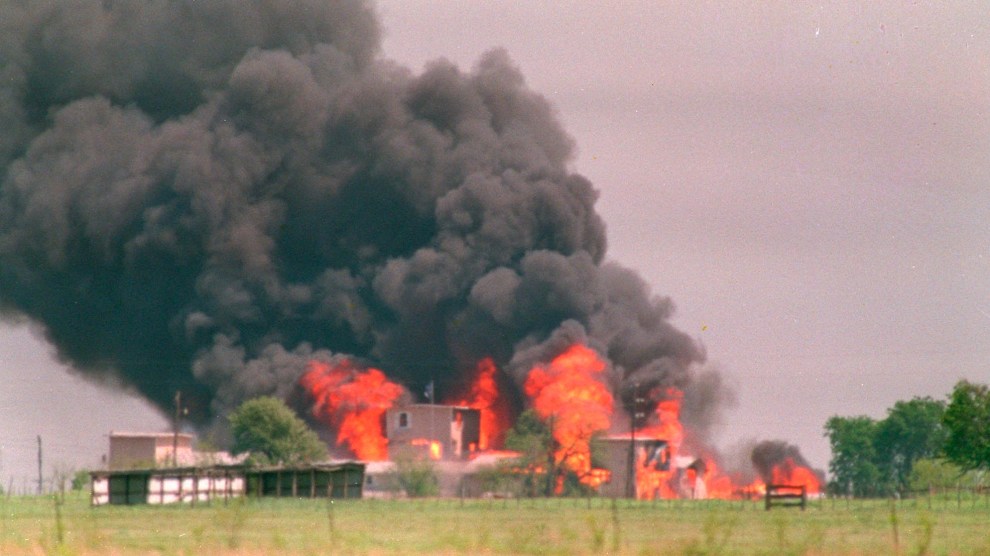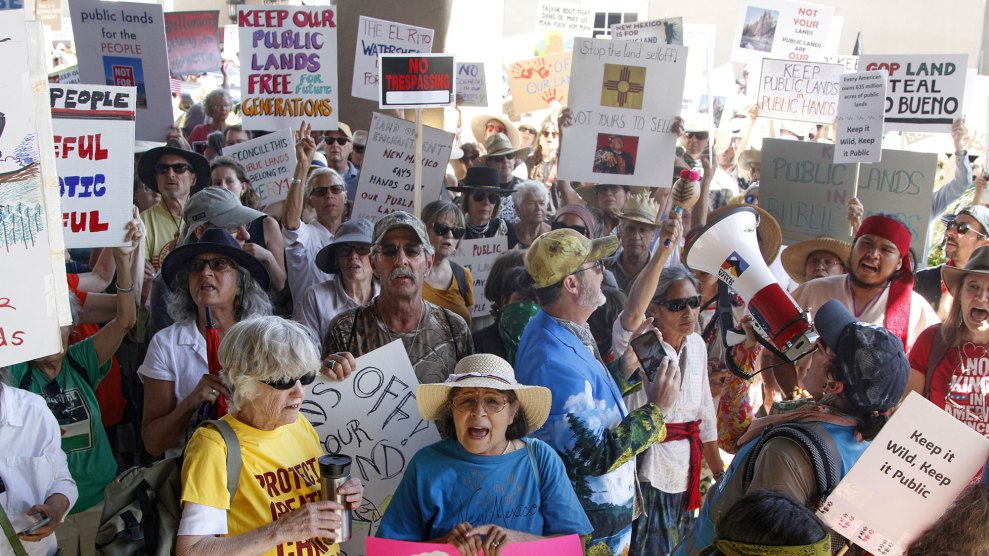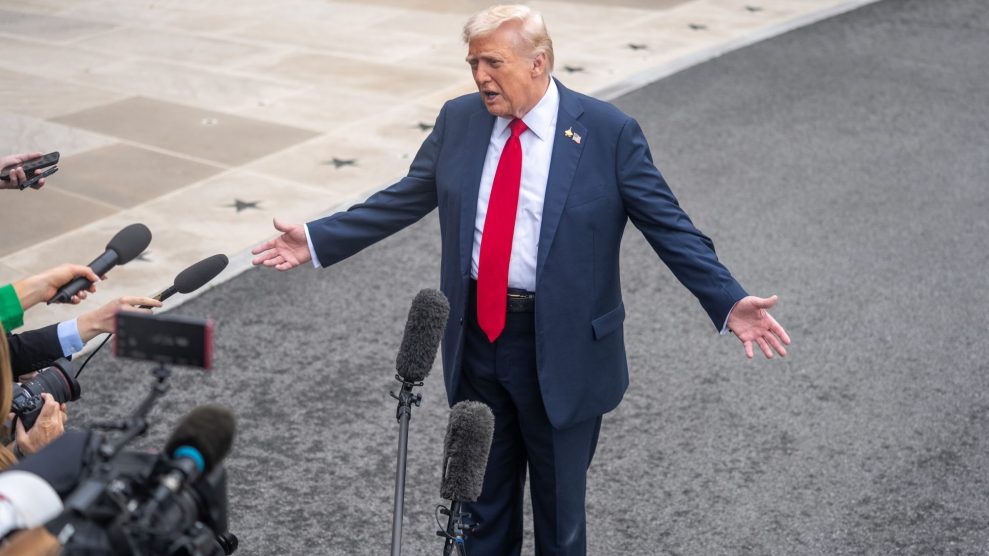
Flames engulfed the Branch Davidian compound in Waco, Texas, on April 19, 1993.Susan Weems/AP File
On Saturday, the first rally of Donald Trump’s 2024 campaign will take place in Waco, Texas. The significance will not be lost on many of his supporters: The event coincides with the 30th anniversary of the FBI’s disastrous 51-day siege of David Koresh’s Branch Davidian complex.
That siege ended on April 19, 1993, when FBI agents filled the compound with tear gas and used tanks to plow down walls as part of a failed effort to get Koresh, who was the leader of a cult, and his followers to surrender. After the compound caught fire—exactly how is still debated—76 people, including Koresh and more than 20 children, died. Exactly two years later, Timothy McVeigh, who’d visited Waco during the siege and went on to obsess about it, bombed the Oklahoma City federal building—killing 168 people.
For a not insignificant slice of the right, Waco became the symbol of a federal government willing to target, torment, and—in more conspiratorial tellings—murder innocent people who just wanted to be left alone. Trump’s Waco rally comes as the former president argues that he, too, is being persecuted by three-letter agencies as he awaits a potential indictment in New York state.
This would would not be the first time a Republican presidential candidate—intentionally or not—sent a divisive message to his base, and to his critics, with a choice of venue. For the first major speech of his 1980 campaign, Ronald Reagan talked about”states’ rights” a few miles from where three civil rights activists were murdered in 1964 outside Philadelphia, Mississippi. In 2020, Trump chose Tulsa, Oklahoma, the site of a 1921 massacre that left as many as 300 Black Americans dead, for the site of his first rally following the Covid shutdown. In a speech originally scheduled for Juneteenth (it was pushed back in response to criticism), Trump made clear that his reelection bid would center on law and order.
The Waco rally sets up the current campaign as a battle against the Deep State forces Trump claims are intent on destroying him and his fellow patriots. A Trump campaign spokesperson says the location is merely about convenience, telling the New York Times that Waco was picked because of its proximity to Texas’ biggest metropolitan areas. But Trump’s supporters are drawing the obvious conclusion. “Waco was an overreach of the government, and today the New York district attorney is practicing an overreach of the government again,” a retiree who is traveling to the rally from Tennessee told the Times.
Like Trump, Koresh—who considered himself the Lamb of God—was not a natural hero for those on the far right. While forcing his disciples into celibacy, Koresh claimed a divine mandate for personal polygamy, married girls at least as young as 14, and fathered more than a dozen children. Texas child protective services investigated, but it was the federal Bureau of Alcohol, Tobacco, and Firearms that secured a search warrant after finding evidence that Branch Davidians were illegally stockpiling automatic weapons and grenades.
In his new book “Waco: David Koresh, the Branch Davidians, and A Legacy of Rage,” investigative journalist Jeff Guinn writes that the ATF saw a raid on the Branch Davidians as a chance to prove its worth. In November 1992, 60 Minutes had run an unflattering investigation about sexual harassment within the agency, and there was talk that President Bill Clinton would fold it into the FBI. The Waco raid—the largest in its history—was planned for just before a March 1993 budget hearing that could help decide the ATF’s fate.
On February 28, 1993, more than 70 agents attempted to take over Koresh’s compound, even though they knew the Branch Davidians were expecting them that day. Four of the agents and six Branch Davidians died in a gun battle before the ATF retreated—setting off the 51-day siege.
On April 19, the FBI tried to end the standoff by having tanks slowly pump the compound full of tear gas. After Branch Davidians fired at the tanks, the FBI unloaded its tear gas reserves and rammed into walls, which caused parts of the building to collapse and may have started the fire.
The FBI argued that Koresh gave an order to start a fire as part of a Jonestown-style mass suicide. (That claim that was later backed up by an investigation from a special counsel appointed by then-Attorney General Janet Reno.) The public was initially on the FBI’s side: A CNN-Gallup poll conducted the day after the raid found that 73 percent of Americans thought the agency acted responsibly. But in the following months and years, that support fell apart as the ATF and FBI’s many blunders came to light. In the aftermath of the Oklahoma City bombing, a poll showed that support for the FBI’s conduct at Waco had dropped to 45 percent. Law enforcement agencies’ errors and pre-existing paranoia on the survivalist right managed to turn a polygamist with child brides into a martyr for the McVeighs of the world. (For a young Alex Jones, Waco was the red pill: “It was like my soap opera,” he once told Texas Monthly.)
In conspiratorial documentaries sympathetic to the Branch Davidians, the church’s members foreshadowed the grievances heard from Trump’s base today. “Anybody who has met any of us Branch Davidians has said, ‘When we meet you, we see how intelligent, how honest’—just what you’re like. And that’s not the picture that’s been painted in the media of what we are at all,” a church member said in a video that was one of McVeigh’s personal favorites.
In the coming days, Trump may well be indicted on allegations related to the hush money he allegedly paid to Stormy Daniels—a minor matter compared to the potential crimes he is being investigated for in other jurisdictions. The New York case could hinge on Manhattan prosecutors’ ability to convince a jury to convict a former president based on what the Times has called an “untested” legal theory.
Like Koresh, who told his followers that a showdown with their enemies in the outside world of “Babylon” was inevitable, Trump has been preparing his base for something like this for years. He posts incessantly about the New York investigation on his social media platform Truth Social, warning on Friday morning of “potential death & destruction in such a false charge could be catastrophic for our Country.”
Some of Trump’s followers have already gone to extreme lengths on his behalf. They do not consider Trump the Lamb of God, but that wasn’t the only thing that kept Koresh’s disciples in thrall. “Oh, there were things about him,” a Branch Davidian whose husband died during the raid later told the Times. “There was no way you couldn’t love him. He kept us entertained all the time.”

















